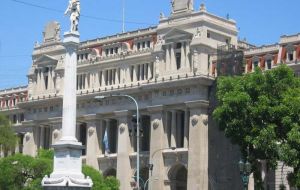MercoPress. South Atlantic News Agency
Argentina's Supreme Court rulings could torpedo export taxes
 Supreme Court building
Supreme Court building Argentina's Supreme Court could play a decisive role in the several months stand off between the administration of President Cristina Fernandez de Kirchner and farmers over the implementation of levies on grains and oil seeds exports.
According to Argentine political analysts Joaquin Morales Solá the court has no specific matter on the controversial Resolution 125, but two appeals which refer to export taxes and regional trade are ready for a ruling. Basically the Court believes that any levies, whenever higher than a few percentage points, are taxes and therefore it is mandatory that they be considered by Congress. The 1994 Constitution is very strict in the issue of collecting moneys from citizens. One of the two cases before the Court, presented by a fishing company refers precisely to export taxes and if they are effectively constitutional. "Levies, o whatever they call them if percentages are above 25, to mention an excessive number, must necessarily be considered by Congress". Apparently and according to Morales Solá this is the prevailing opinion among the magistrates. The farmers conflict detonated on March 11 when export levies were hiked well above 35% from an existing floor of over 25%, which not only means they are technically unconstitutional but also triggered a "senseless" four months plus conflict. A second case refers to one of Argentina's main dairy exporters and levies on butter shipped to neighboring Paraguay, a founding member of Mercosur. The company argues that Mercosur guarantees the free circulation of goods, services and production among country members and the elimination of customs duties and non tariff restrictions to the circulation of goods, or any other equivalent restrictive decision. The Mercosur treaty also binds country members to macroeconomic and sector policies coordination between country members particularly regarding "foreign trade, agriculture and manufacturing". The dairy case is also before the Mercosur arbitration tribunal, but if the Argentine Supreme Court rules that export taxes violate the block's foundation charter, the whole Kirchner administration stance would fall to pieces. This was in essence the objection of the Uruguay delegation during the recent summit when it argued that including export levies in the Mercosur Customs Code, (as was proposed and requested by President Cristina Kirchner) was contrary to the letter and spirit of the founding charter. Brazil, quietly and diplomatically, also supported the Uruguayan position, which according to Morales Solá makes even more mind boggling the blunder of Mrs. Kirchner. Did she believe that ideology solidarity is stronger that signed agreements between countries, particularly with such a pragmatic partner as Brazil? And even when the political feeling in Argentina's Congress is changing in spite of former president Nestor Kirchner threats to the "undisciplined", many legislators will vote for significant amendments to the controversial Resolution 125. Actually a growing group of dissidents from the ruling coalition and former governors are drafting a new tax bill which apparently could have the necessary votes for its approval, and more important mark the beginning of an active participant Congress which so far has been shadowed by an overwhelming Executive presence. Nevertheless Morales Solá ends saying that the Supreme Court, which has repeatedly shown growing autonomy from the Kirchner hegemony, will undoubtedly help to the birth of a new Kirchner-challenging republic after the four months conflict with farmers. Argentina is rapidly loosing fear of the Kirchner dominance, and their obstinacy, instead of dialogue, is further weakening them. In a previous column analyst Morales Solá quoted a Chinese proverb which says that every crisis is an opportunity. However Argentina, ever so creative and original, in spite of the most favorable conditions for agriculture since World War II, turned the axiom upside down: "every opportunity is a crisis".




Top Comments
Disclaimer & comment rulesCommenting for this story is now closed.
If you have a Facebook account, become a fan and comment on our Facebook Page!